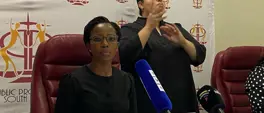LEBOGANG RAMAFOKO: Mamokgethi Phakeng’s politics on abortion perpetuates harmful stigma
Lebogang Ramafoko
18 October 2024 | 8:31The former UCT Vice Chancellor, while defending her decision to attend a Chris Brown concert, shamed a young woman by asking whether in a free country, is ‘freedom only reserved for abortionists?’, is endangering women, writes Lebogang Ramafoko.
A few years ago, while still the Vice Chancellor at the University of Cape Town (UCT), Professor Mamokgethi Phakeng attracted a lot of criticism when she reacted on allegations of rape made by a student.
"She must say what her real agenda is," Phakeng remarked at the time.
The student had accused a professor at the prestigious institution of sexual assault, and Phakeng’s response was to accuse her of having an agenda. While she would later issue an apology after the Student Representative Council (SRC) of the university called for her immediate suspension, the incident provided a glimpse into Phakeng’s problematic politics on gender-based violence (GBV).
These politics recently reared their ugly head when Phakeng, defending her decision to attend a Chris Brown concert, shamed a young woman by asking whether in a free country, is "freedom only reserved for abortionists?"
The context of Phakeng’s response is that the young woman, activist Yolanda Dyantyi, had once publicly declared she had terminated an unwanted pregnancy in her younger years. Dyantyi had stated that her decision to terminate was informed by her financial circumstances, arguing she couldn’t afford to take care of a child when she was barely able to afford her own life.
Dyantyi is a dedicated anti-GBV activist and feminist who has had to pay a very heavy price for her commitment to holding perpetrators of violence against women accountable.
In 2017, anti-GBV protests broke out at Rhodes University, with victims and survivors publicly naming their perpetrators. Dyantyi, who was unwavering in her support for these women, would later be charged with defamation, insubordination and alleged kidnapping by the university. She would subsequently be expelled.
Her fight, which had been about seeking justice for victims and survivors of GBV, would transition into a fight for her right to education. It’s a fight that would take five years of her life, culminating in a victory at the Supreme Court of Appeal, where Rhodes University’s guilty judgment was set aside with costs.
And while organisations such as the Socio-Economic Rights Institute of South Africa (SERI) had fought alongside her, it was no doubt a painful and lonely war for a young woman who had to watch her peers progress in life while she was being punished for fighting a just cause.
This is who Phakeng sought to shame – a woman who has given up so much for the fight against GBV. And Phakeng did this in defence of her decision to attend the concert of a convicted perpetrator with a documented history of physically assaulting and psychologically traumatising multiple women.
Phakeng’s attempts at shaming Dyantyi are, in many ways, not about the young woman. They reflect what she thinks about the termination of pregnancy and of women who opt for this choice.
The Constitution of our country recognises and protects the right of persons to make decisions concerning reproduction, and to security in and of their bodies. This constitutionally enshrined right to bodily autonomy did not emerge from a vacuum but was a product of struggle by women in South Africa and the world.
Prior to the adoption of the Choice on Termination of Pregnancy Act (no. 92 of 1996), women were denied the right to make decisions about their bodies. The Abortion and Sterilization Act (no. 2 of 1975) was not only restrictive, but it also contained inaccessible provisions that imperiled working-class women in particular.
It was for this reason that, following the abolition of apartheid and the adoption of a new Constitution, one of the key arguments of the feminist movement was that the State had the responsibility to provide reproductive health to all, and to provide safe conditions under which the right of choice can be exercised without fear or harm.
Around the world, women are being harmed not only by laws that prohibit termination but by societal cultures toward women who terminate.
The stigma faced by women who terminate pregnancies has led to the rise in unsafe termination practices that are putting women in serious danger. When women with unintended pregnancies face barriers to attaining safe, timely, affordable, geographically reachable, respectful and non-discriminatory abortion care, they often resort to unsafe termination.
According to the findings of Global causes of maternal death: A WHO systematic analysis, a review from 2003 to 2012, up to 13% of maternal deaths are linked to abortive pregnancy outcomes.
The review also noted that maternal deaths due to termination, and more specifically unsafe termination, are often misclassified and underreported, given the stigma. In addition to this, women who undergo unsafe terminations because of legislative prohibitions and societal stigma also face physical health risks that go unreported, leading to chronic pain, disability, debility, and even death.
These include uterine perforation (caused when the uterus is pierced by a sharp object), damage to the genital tract, and internal organs as a consequence of inserting dangerous objects into the vagina or anus, heavy bleeding, infection and incomplete termination (failure to remove or expel all pregnancy tissue from the uterus).
Researchers such as Maddow-Zimet and Singh, in their 2012 study on unsafe abortions in 26 developing countries, have also argued that restrictive termination regulation risks constituting a violation of human rights of women and girls, including the right to privacy and the right to non-discrimination and equality, while also imposing financial burdens on women and girls.
Regulations that force women to travel to attain legal care, or require mandatory counselling or waiting periods, lead to loss of income and other financial costs and can make termination inaccessible to women with low resources.
This is also evidenced in the challenges that women have been facing in the United States since the Supreme Court’s overturning of Roe v Wade in 2022, ending the constitutional right to termination of pregnancy. In the absence of federal protections, state legislatures have become arbiters of termination access, with some states banning or severely restricting termination. Most bans are enforced through criminal penalties and jail time for providers.
Studies by organisations such as the Center for American Progress demonstrate that it is working-class women from marginalised groups who are most impacted.
Phakeng’s shaming and stigmatisation of Dyantyi is reflective of this harmful anti-abortion global movement that is endangering women.
When women like Phakeng, who enjoy social and economic power in an unequal society like ours, use their positionality to cause harm, it reflects a dangerous power dynamic that has historically imperiled working-class women, particularly Black and Coloured women, who are most affected by structural inequalities and inequities in health access.
It is deeply concerning and must be condemned because there is so much at stake – including women’s very lives.
Lebogang Ramafoko is the Executive Director of Oxfam South Africa.
Get the whole picture 💡
Take a look at the topic timeline for all related articles.
















